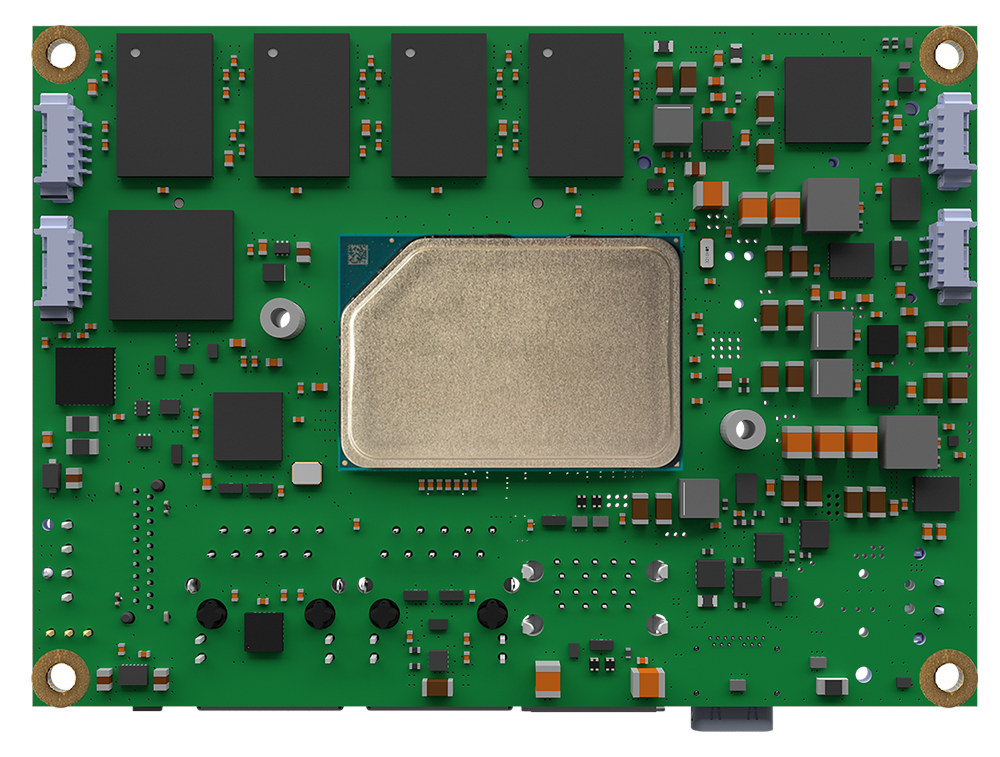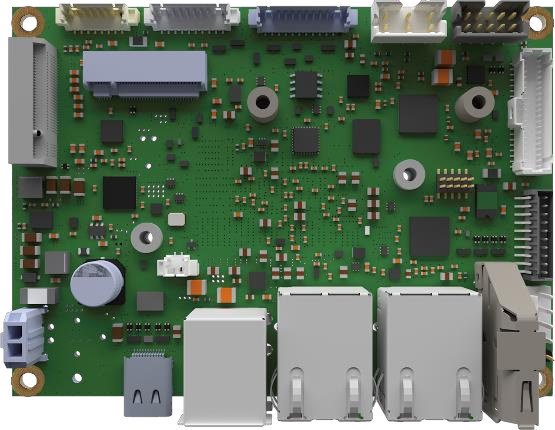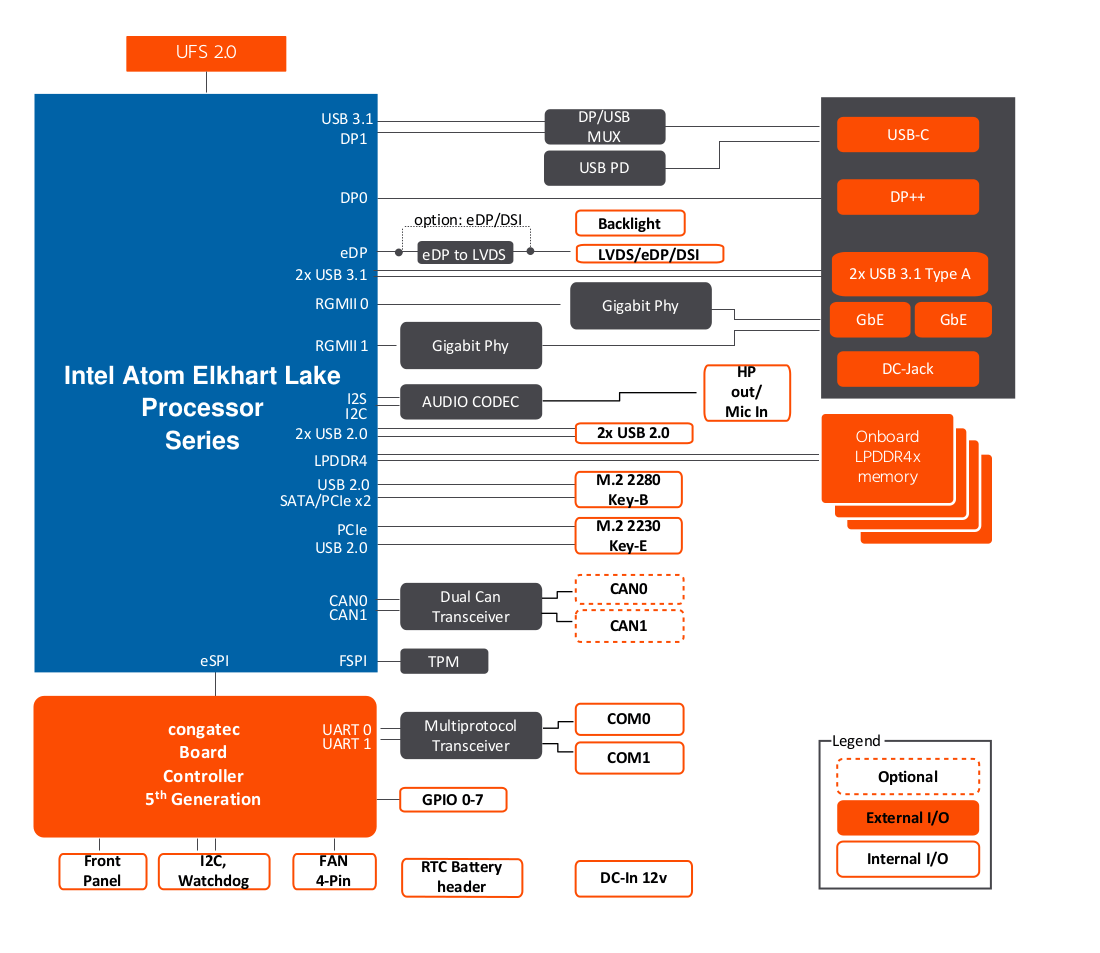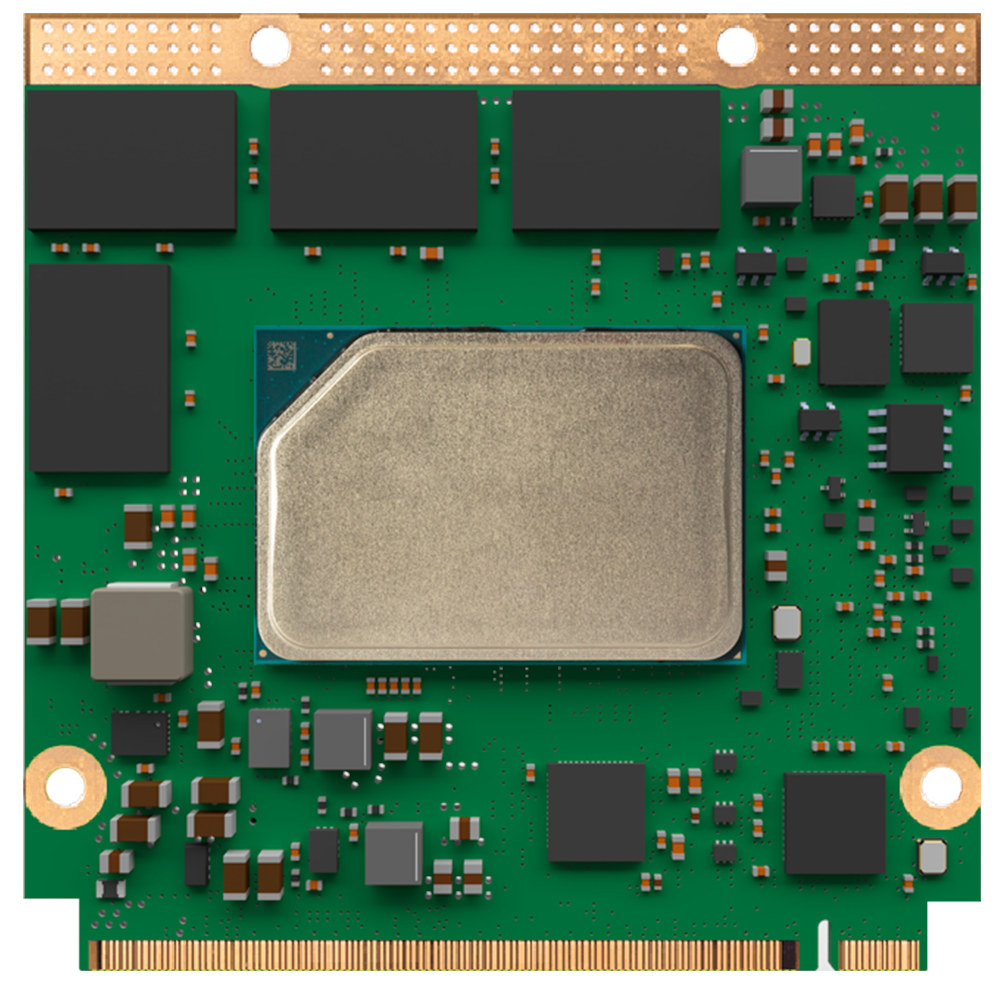With the announcement of Intel Elkhart Lake IoT-optimized processors, we should expect embedded systems companies to unveil their own Atom x6000E and Celeron/Pentium Elkhart Lake powered products, and one of the first to do so is Congatec with the introduction of four different Elkhart Lake computers-on-module (CoM) following Qseven, SMARC, and COM Express standards, as well as a Pico-ITX SBC.
conga-PA7 Atom x6000E SBC (with Celeron/Pentium J optional)
- SoC – Choice of eight different Elkhart Lake processors from the 6W Atom x6211E dual-core processor to the 10W Intel Pentium J6425 quad-core processor up to 3.0 GHz, all with 10th Gen Intel UHD graphics
- System Memory – Up to 16GB quad-channel onboard LPDDR4x
- Storage
- 32GB or 64GB UFS 2.0 flash (optional up to 512GB)
- M.2 SATA/PCIe SSD support (see expansion)
- 32 MB serial flash for AMI Aptio UEFI firmware
- Video
- DisplayPort DP++ video output up to 4Kp60
- 1x USB-C port with DisplayPort Alt mode
- 1x LVDS 18/24-bit connector or optional eDP or MIPI-DSI
- Backlight power connector (5V, 12V)
- Audio – 1x Audio I2S connector (HP/Line Out, MIC In, optional DMIC)
- Networking – Dual Gigabit Ethernet (RJ45) with TSN support and Out-Of-Band Management, as well as 2x real-time triggers
- USB – 1x USB 3.1 Gen2 Type-C with USB PD and DisplayPort Alt Mode, 2x USB 3.1 Gen2 Type-A ports, 2x USB 2.0 internal connectors
- Serial – 2x COM (RS232/422/485, 2x optional 2x CAN bus
- Expansion
- 3x Feature Connectors
- 1x M.2 key-B type 2280 (2 PCIe lanes/SATA, USB 2.0)
- 1x M.2 key-E type (1 PCIe lane, USB 2.0)
- Misc – 1x Fan Connector with PWM, TPM 2.0, congatec Board Controller (watchdog, HW monitor, etc..),
- Power Supply – 12V DC via 2-pin terminal block; ACPI 5 .0 compliant; Smart Battery Management
- Dimensions – 100 x 72 mm (Pico-ITX form factor)
- Temperature Range
- Commercial – Operating: 0 to +60°C; storage: -20 to +85°C
- Industrial – Operating: -40 to +85°C; storage: -40 to +85°C
conga-QA7 Qseven Elkhart Lake SoM
Key features and specifications:
- SoC – Choice of eight different Elkhart Lake processors
- System Memory – Up to 16GB onboard LPDDR4x
- Storage – Up to 64GB UFS 2.0 flash
- Ethernet – Intel GbE with TSN support and Out-Of-Band Management, real-time trigger
- Qseven compliant 230-pin MXM edge connector with the following I/Os
- Storage – 2x SATA III (6Gb/s)
- Video
- Dual-channel LVDS transmitter up to 1920×1200 @ 60Hz shared with eDP or MIPI-DSI x4 (option)
- DisplayPort 1.2 up to 4096×2160 or HDMI 1.4b up to 3840×2160
- Networking – Gigabit Ethernet
- USB – 2x USB 3.1 Gen2, up to 8x USB 2.0 ( including 1x OTG)
- SDIO
- 4 x PCIe Gen3
- I²C bus, SM-Bus, SPI, UART, CAN Bus, LPC bus
- Dimensions – 70 x 70 mm (Qseven form factor)
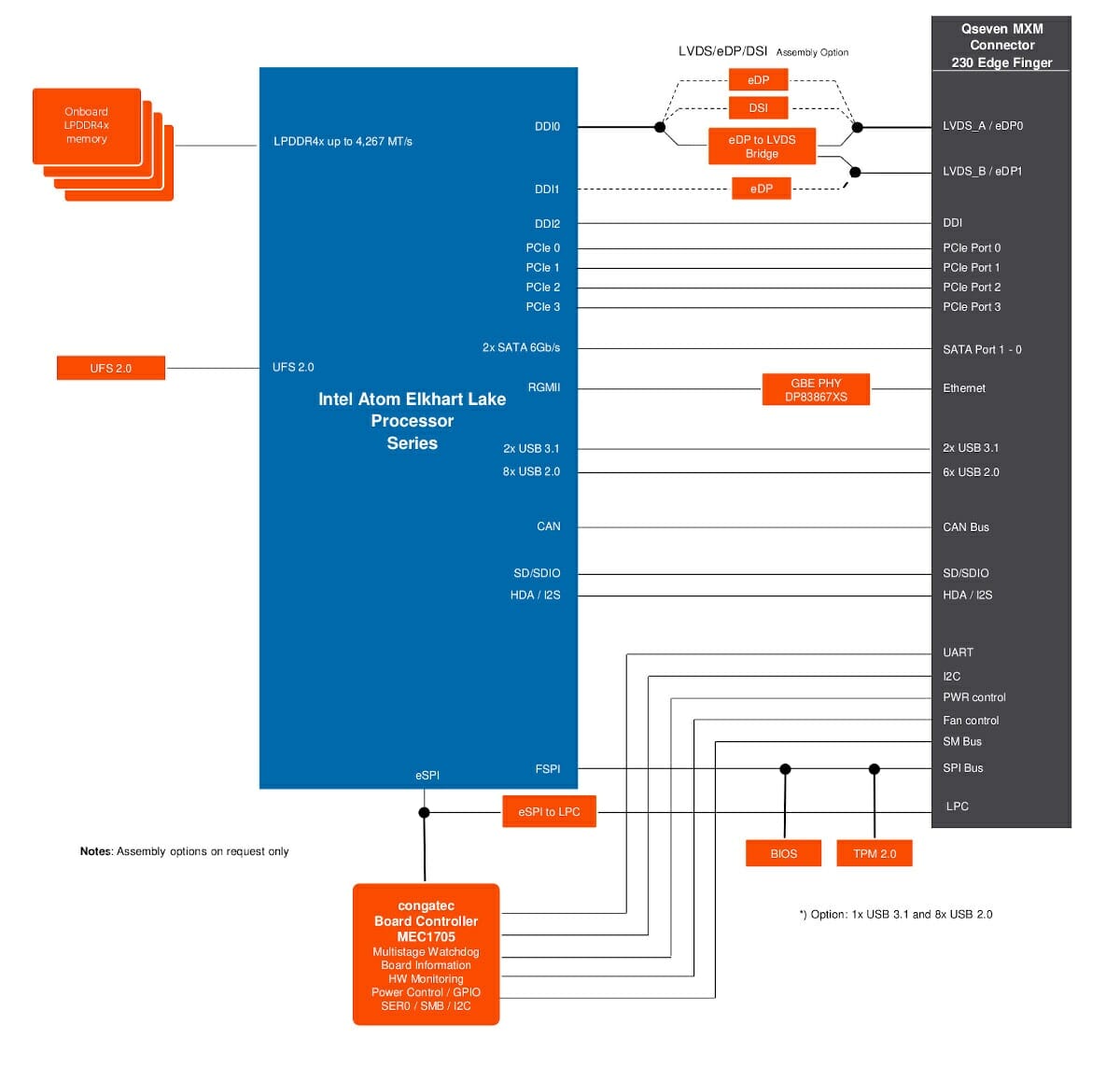
conga-SA7 SMARC 2.1 Elkhart Lake System-on-Module
Key features and specifications:
- SoC – Choice of eight different Elkhart Lake processors
- System Memory – Up to 16GB onboard LPDDR4x
- Storage – 32GB or 64GB UFS 2.0 flash (optional up to 512GB)
- Networking
- 2x Intel GbE with TSN support and Out-Of-Band Management, 2x real-time triggers
- Optional on-module M.2 1216 WiFi/Bluetooth module
- SMARC compliant 314-pin MXM 3.0 edge connector with the following I/Os
- Storage – 1x SATA III (6Gb/s)
- Video
- Dual-channel LVDS transmitter up to 1920×1200 @ 60Hz shared with eDP or MIPI-DSI x4 (option)
- DisplayPort 1.2 up to 4096×2160 or HDMI 1.4b up to 4096×2160 @ 60Hz
- Audio – 1x I2S
- Networking – 2x Gigabit Ethernet
- USB – 2x USB 3.1 Gen2 including 1x OTG, 6x USB 2.0 including 1x OTG
- SDIO
- Up to 4 x PCIe Gen3
- 2x I²C bus, 1x SPI, 1x eSPI, 4x UART, 2x CAN Bus, GPIOs
- Dimensions – 82 x 50 mm (SMARC 2.1 form factor)
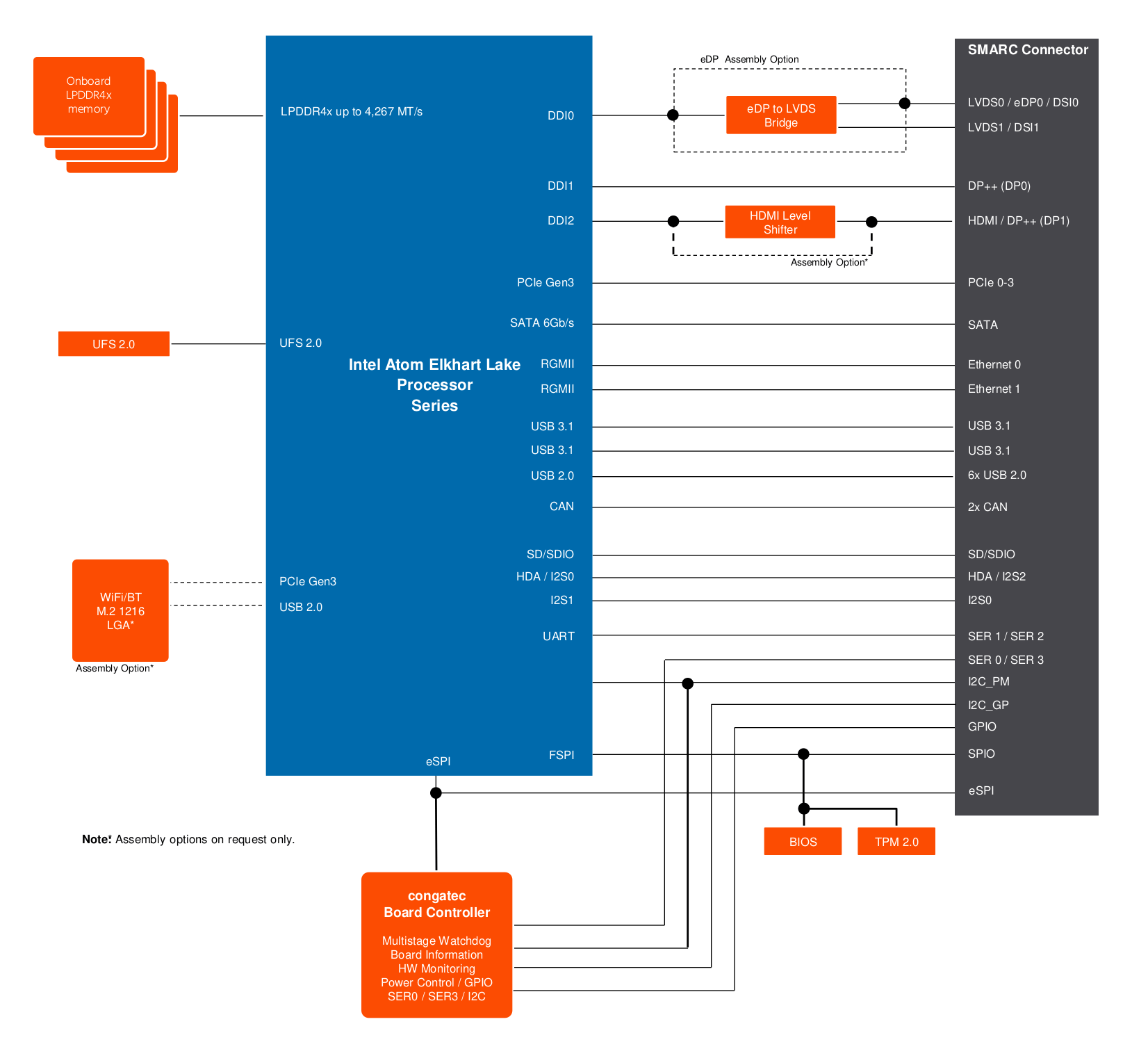
conga-MA7 & conga-TCA7 COM Express Mini Type 10 / Type 6 Compact CPU Modules
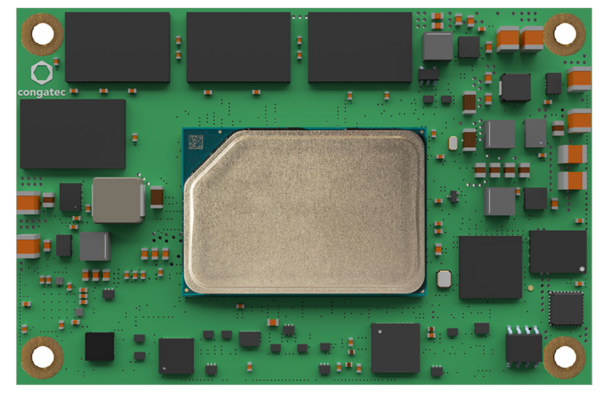
We’ve had a lot of specs to digest already so I’ll try to merge the specifications of the two Elkhart Lake COM Express modules:
- SoC – Choice of eight different Elkhart Lake processors
- System Memory
- conga-MA7 – Up to 16GB onboard LPDDR4x
- conga-TCA7 – Up to 16GB via 2x SO-DIMM (dual-channel LPDDR4 up to 3.200 MT/s)
- Storage – 32GB or 64GB UFS 2.0 flash
- Networking – 1x Intel GbE with TSN support and Out-Of-Band Management, real-time trigger
- COM Express Mini Type 10 (conga-MA7) or Type 6 Compact (conga-TCA7) board to board connectors with the following I/Os
- Storage – 2x SATA III (6Gb/s)
- Video
- conga-MA7
- Single-channel LVDS interface up to 1920×1200 @ 60Hz shared with eDP up to 3840×2160 @ 60Hz (option)
- DisplayPort 1.4 4096×2160 @ 60Hz or HDMI 2.0 4096×2160 @ 60Hz
- conga-TCA7
- Dual-channel 18/24 bit LVDS interface up to 1920×1200@60Hz shared with eDP up to 3840×2160 @ 60Hz (option)
- 2x DisplayPort 1.4 4096×2160 @ 60Hz or HDMI 2.0 4096×2160 @ 60Hz
- conga-MA7
- Networking – 1x Gigabit Ethernet
- USB – 2 x USB 3.1 Gen2, up to 8x USB 2.0
- Optional SDIO (conga-MA7 only)
- PCIe
- conga-MA7 – Up to 4x PCIe Gen3
- conga-TCA7 – Up to 6x PCIe Gen3
- 2x UART, CAN Bus, GPIOs, I²C bus, SM-Bus, SPI, LPC bus
- Dimensions
- conga-MA7 – 55 x 84 mm (COM Express Mini Type 10)
- conga-TCA7 – 95 x 95 mm (COM Express Type 6 Compact)
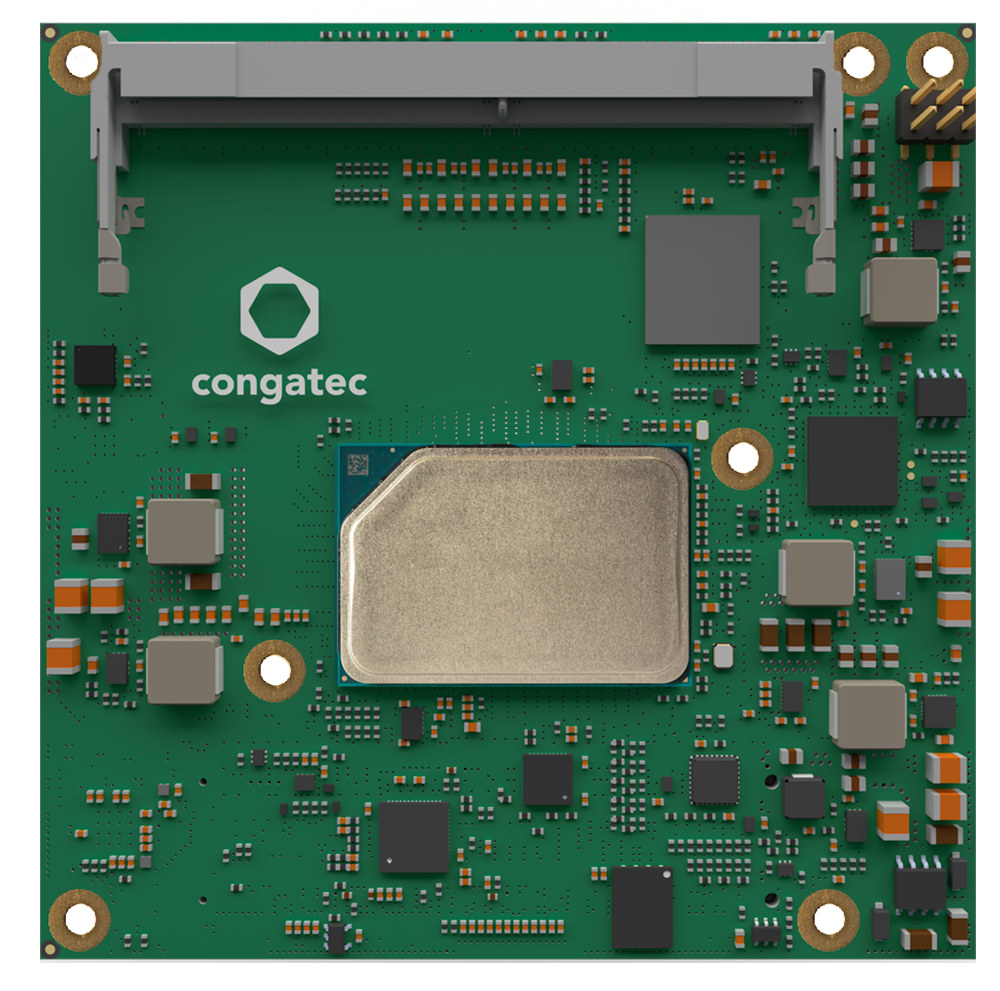
Software support and More Info
It should be noted that all computers and systems-on-module come with congatec Board Controller, and are offered in both commercial and industrial temperature ranges. It’s interesting to note that while Elkhart Lake processors support 2.5GbE networking, congatec does not provide the option in any of its modules or even the single board computer. It’s hard to understand why it’s not offered in the latter at least as an option, but some SoM standards may limit Ethernet to Gigabit speeds.
All platforms support Microsoft Windows 10, Microsoft Windows 10 IoT Enterprise, Microsoft Windows IoT 10 Core, Linux, the Yocto Project, Android
and RTS (Real-Time Systems) Hypervisor.
The company did not provide availability information for the Elkhart Lake SBC and modules, but since the processors are supposed to launch in Q1 2021, it’s clearly broad availability will happen next year, even though early samples may be available now (or not). Further information may be found on the relevant product page.

Jean-Luc started CNX Software in 2010 as a part-time endeavor, before quitting his job as a software engineering manager, and starting to write daily news, and reviews full time later in 2011.
Support CNX Software! Donate via cryptocurrencies, become a Patron on Patreon, or purchase goods on Amazon or Aliexpress


